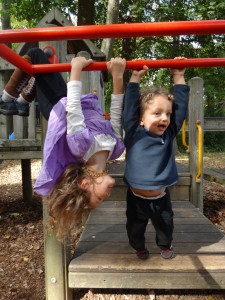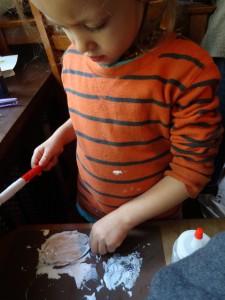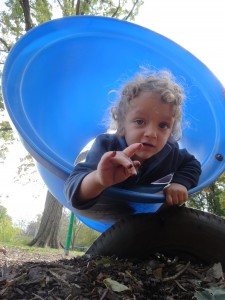7 Counterintuitive Parenting Tips and Insights for the Conscious Parent
[This post is the third in a series of posts of breaking the cycle of anger, yelling and guilt and rewiring for peace, connection and presence. The first post was on my parenting breakdown and breakthrough. The second post was on shifting my goal from parenting perfection to parenting peace. This post is on key perspective shifts that parents can use, that I used, in the rough moments of parenting.]
Sometimes as parents we feel trapped or stuck, like things are turned upside down.
After the 5th bout of tandem crying that morning, I knew I needed to write this blogpost.There are things we have been told as people and parents that can lead us down an unhelpful path. I needed to get these cleared up so we can move forward more confidently and better get on with the business of loving our children.
As I shared on the monthly Community Call, there are parenting traps that we fall into despite our best intentions and hardest efforts. I wanted to share some of the important insights many parents know somewhere inside and may have trouble accessing with all the background noise.
7 Counterintuitive Tips, for the parent seeking cooperation, peace, ease as well as rest, relaxation and renewal.
1. Sweat the small stuff.
This is simple, but counterintuitive, and I’m not talking about sweeping. (Feel free to let that small stuff go.) We want to help our kids get some perspective about what’s important in the world. Still, what is important in the world is different for them than for us. Stopping to say, “I see/hear this is so important to you” is validating for a child’s sense of worth and efficacy.
We do not need to solve every problem. Our children find power and strength, creativity and confidence when we ask, “I wonder how you might…” Simply sharing that belief in them, in their capabilities helps them see themselves and the world anew.
Plus, by giving lots of eye contact, touch or connected and empathetic language or simply our presence during the little upsets or in the peaceful moments, we can avoid the larger meltdowns and save them for the deep emotional projects.
2. Time “wasted” now saves time needed later.
This is related to the above. It feels like time is being wasted. Listening to your child crying. Waiting for them to do something themselves like go up the stairs, cut, or get dressed. Doing the same thing over and over and over.
Your time now saves more time later.
For instance, this weekend I was solo parenting my two kids. We had an apple preserving party to go to take care of the bushel of apples we got through the CSA. I knew this would be hours of focused attention away from my kids. I noticed my daughter was getting teary at this, that and the other “small” thing during the morning while we got ready. I chose to do some staylistening in the car when I saw she was going into a deep cry. We took about 15 minutes, longer than usual at this point when we have been doing it for a while.
She really let out a good amount of emotion, maybe around her dad being away (who knows), and then she stopped and asked for something. At the party, she spent 5+ hours occupying herself while staying very connected with me and cooperating with me to stay safe and to keep me aware of her brother. I was so grateful for her help, and I know that time together that may have previously felt like a waste to me saved me a lot of time, hurt and frustration during the party and even after.
3. You can share how you are feeling with your child.
It is the way we share that is important. If I say, “you are making me angry,” I am not taking responsibility for my feelings. If I say “that is bad,” or some other value judgment, I am not being clear or giving the full picture.
The reality is that we all have feelings, and everything is a shade of gray. It helps your child find an anchor in the sometimes stormy ocean of life when you say, “I feel angry when you woke your brother up from his nap because I need some private time with you and some time to do a few things for our family. Now he is awake, and I feel sad that we cannot play our special Mama Time games. Are you willing next time to come out of the car and talk to me about what you are needing?”
Or, take the situation where a kid says or does something and another kid cries. Often times I hear parents tell their children, “You made her sad.” We choose a powerful and subtle shift when we say instead, even with a young toddler, “Wow, look at your sister. I see her face is upset and she is crying. She is feeling really hurt after you hit her on the head. I wonder what she might be needing.” With no intention of making our child do anything.
Feeling shared is connection shared. You sharing your feelings and needs — not perfectly, but present with and through them — models how they might share and live with their big emotions. When your child shares their feelings with you, it is everything. Their choosing to connect with you is the main thing that will keep you close as they grow in independence. It is a deep and powerful gift you can give your children, and yourself.

Parenting is a journey of letting go.
4. Let go.
Parenting is a journey of letting go. From pregnancy and birth through toddlerhood and teenagers, parents are requested to let go continually. Yet at the very same time, we are asked to and wish to be close and present.
As parents we want so much for our children. We work hard to hold everything together, to bring everything together for our children. It feels hard to do that dance where they grow older and more independent, yet they need us. There are so many opportunities for power struggles, fear or worry.
There is deep power in letting go. Letting go of expectations. Letting go into our emotions. Letting them wash over us. Staying with those feelings of hurt, sadness, anger, fear and worry.
Releasing into the flow of the moment, the flow of needs, the rhythm of life.
Sometimes these letting go moments are the most magical, like two young children with their mouth agape in wonder at the wind rushing musically through the trees and playing with the dancing leaves…
5. Make a fuss.
It may seem like it’s just another day, like yesterday, or it may seem clear that waking up from a nap it’s only a hour or more later on the same day. Your young child, however, may not feel that briefness. To them, it’s been a long, long time.
Making a fuss over our kids when we see them after separation, after sleep or a period of work for example, helps them reconnect. Giving lots of eye contact, making our bodies match or physically getting down to their level, and getting in close are all ways to “make a fuss” over our child.
Sure, teens and toddlers are not always interested in hugs. We can give them our full presence and appreciation. We can help them feel their preciousness and the preciousness of life, right from that point of reconnection after separation. What could be hard may now flow more easily.
6. More is less.
If less is more then more is definitely sometimes less. More stuff — toys, books, activities in the weekly rhythm — even if it is awesome stuff, can get in the way of the simplicity of living and the simple pleasure of being.
More “help” than kids need is less helpful than we wish. Swooping in and talking at or doing for a child when they are hurt or in trouble is more than a child may need and less effective for them to connect to and do for themselves.
More volume is usually less effective. More information leading to overwhelm and confusion and possibly shutdown is less inspiring.
More is less in a number of parenting and life scenarios…
7. Focus on You.
I’m going to keep saying this one because it’s where our power lies, yet it is counterintuitive when all of our parent fibers are focused on our kids so intensely. Our kids get nothing from us that does not come through us. If our good intentions are slogging through the mud of sleep deprivation, thirst, hunger, isolation, overwhelm, or chaos, they may not reach our desired target as intended.
This goes way beyond the oxygen mask metaphor that we hear about. If we want our children to love themselves, with any mistakes, when they are teenagers seeking love or as parents themselves with their own kids, they need to experience us loving ourselves. If they are going to learn to navigate the flow of feelings and the nature of needs that arise in all the humans they care about, they need to see and hear us navigating our own emotions and life situations by caring for ourselves.
This can mean stopping to take a deep breath and focus on you when you are waiting at a stop light. It might mean you make a point to turn your face to the sun for a moment while you are at the park with the kids. Self care can be small and simple, but it is powerful.
These 7 things, each of them, were incredibly helpful for me during my solo parenting experience of tandem nurturing my two children.
They had multiple bouts of simultaneous crying this weekend, and I felt more clear and confident in my choice to connect. Through these insights and the parenting tools I used proactively and actively, my children and I connected and had some deep moments of peace, love, understanding and compassionate cooperation.
Because of these counterintuitive perspective shifts, I felt the joy of parenting and being with my children even in the hardest moments of intense emotion.
What do you do when parenting gets rough? How do you find the joy in parenting in the tough times?
[Want to learn the tools I am using to find peace, connection and presence in the hard moments? Register for my upcoming Parenting Workshop and schedule your Bonus “Serenity Now” Session to take place as immediately as possible to bring you some relief and personalized support. Ready to Rewire? Join the Coaching Circle starting December 1 to grab one of only 8 spots for getting close, connected coaching towards shifting your parenting habits, for good.]





[…] From Parenting Break Down to Whole Family Break Through 7 Counterintuitive Parenting Tips and Insights for the Conscious Parent […]